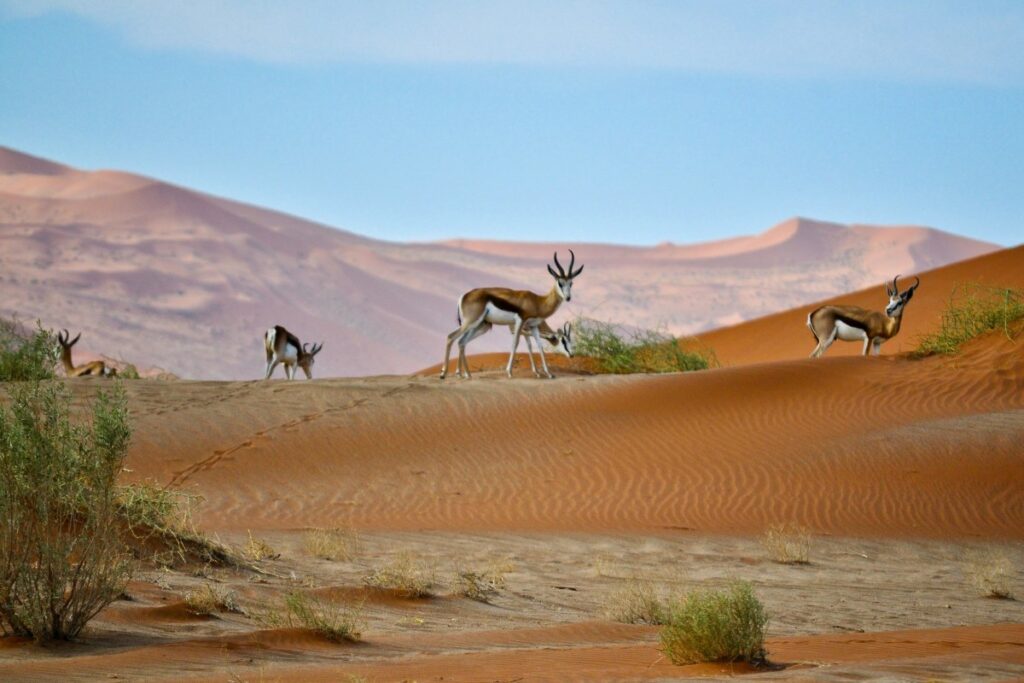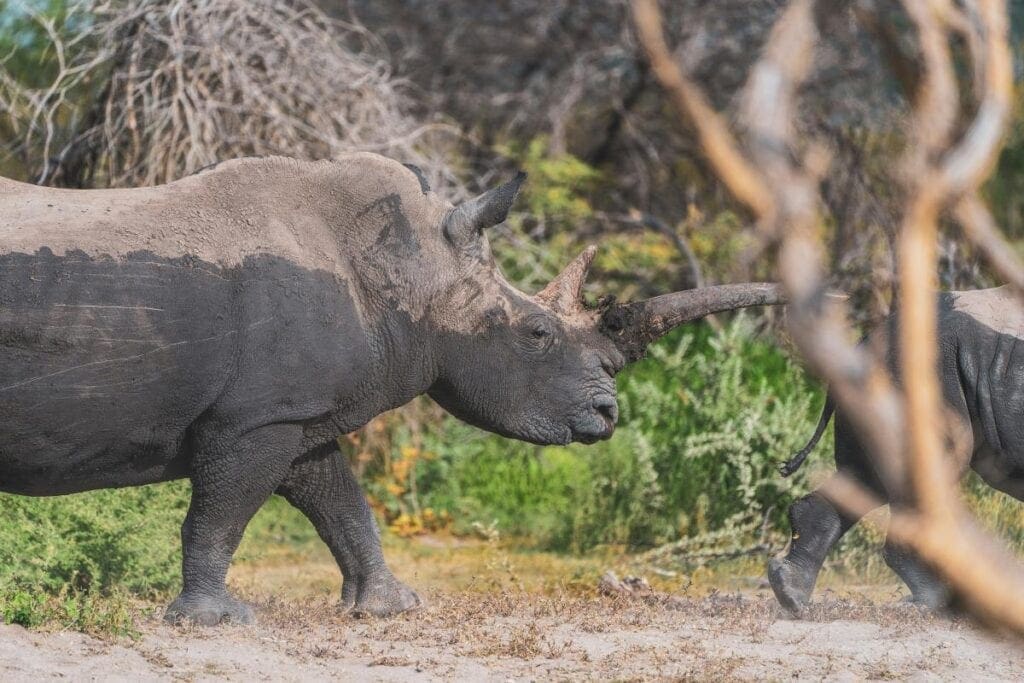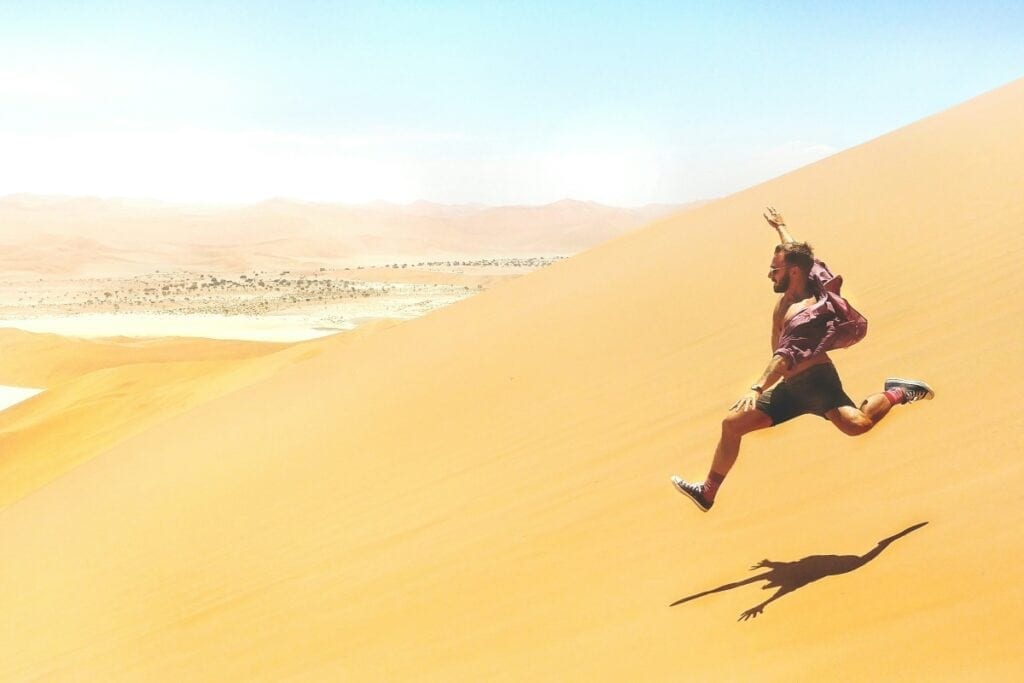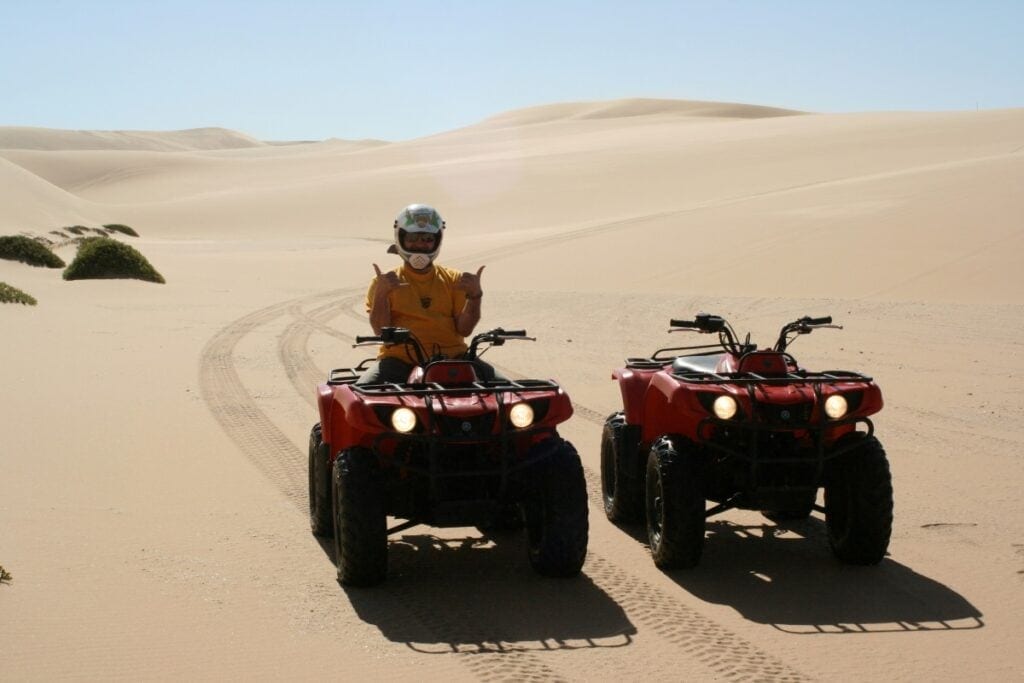Namibia, a seemingly endless, mostly arid country in southern Africa, is increasingly being recognised not just for its captivating landscapes and wildlife, but also its commitment to ecological sustainability.
From its haunting Skeleton Coast, to the lush wetlands system of central northern Namibia, to the striking red dunes of the Namib Desert, Namibia has integrated eco-friendly practices into its tourism industry. Let’s take a look at the country’s ecotourism initiatives and how you can be a responsible ecotourist on your next adventure.

Namibia’s Ecotourism Principles
The World Wildlife Fund refers to Namibia as a conservation success story. After becoming independent in 1990, Namibia became the first African country to write environmental protection into its constitution. A law was also passed empowering communities to set up “conservancies” that they manage and benefit from directly.
This has transformed the outlook for people and wildlife in Namibia. In fact, both wildlife and people are thriving. Pre-Covid, conservancy areas were generating more than 150 million Namibian dollars per year. Wildlife numbers have increased dramatically and the number of wildlife conservancies has also grown. Large tracts of land have been created where animals can move freely. An impressive 45.6% of Namibia’s total land area is now available to its wildlife!
Here are the principles that Namibia has employed to work this eco-miracle:
1. Conservation Through Tourism
Namibia actively promotes conservation as a cornerstone of its tourism industry. A portion of the profits from national parks and certain lodges are channelled back into conservation efforts, ensuring protection for the country’s rich biodiversity.
2. Community Engagement
Many eco-lodges and tour operators work in close partnership with local communities. Job creation is an important aspect of this collaboration, and well over 3,200 jobs have been created. As it’s conservatively estimated that five people benefit directly and indirectly from each job created, job creation has an extremely positive impact.
Game rangers, wildlife guides, lodge staff, and anti-poaching rangers often come from the local communities. Community involvement ensures that people benefit directly from tourism, often leading to improvements in local infrastructure, education, and health services.
This has had a positive impact on poaching activities. As local communities get to understand that there is much more long-term benefit in conserving animals than in killing them for a short-term, one-off gain, poachers are largely no longer welcome.
3. Educational Experiences
Namibia’s eco-tour operators prioritise educating visitors about the environment, local cultures, and conservation efforts. Many of these visitors become potent ambassadors for conservation. This leads to increased awareness, better funding and greater involvement in conservation efforts to protect endangered animals like rhinos, pangolins, cheetahs, and others.

Noteworthy Ecotourism Initiatives in Namibia
1. Communal Conservancies
Today, there are over 86 registered community conservancies in Namibia. Here, communities manage and benefit directly from wildlife tourism on their communal lands. Plans for a further 68 conservancies are underway.
2. Eco-Lodges and Hotels
Eco-accommodation can be loosely defined as accommodation that’s made significant improvements in order to minimise its environmental footprint. At these establishments, conservation is the watchword, and indeed, conservation is a vital cornerstone of any Namibian wildlife experience.
From the infamous Skeleton Coast, to the banks of the ephemeral Hoanib River, to the dramatic red dunes of Sossusvlei in the Namib, many accommodations have gone “green”. More and more Namibian eco-lodges, hotels, guesthouses and campsites utilise sustainable practices such as solar power, water recycling, sustainable building materials, and organic gardening.
3. Establishment of an Eco-Certification System
Eco Awards Namibia is a dynamic alliance of government and private sector organisations that developed an ecotourism certification programme. Receiving an eco “flower” certification is an acknowledgement that a lodge or resort is run according to ecotourism principles and guidelines.
The programme promotes the sustainable use of resources, and advocates the key concepts of recycling, reusing and reducing. It has contributed significantly to Namibia’s impressive conservation success story. Shannon Stowell, the president of the Adventure Travel Trade Association (ATTA), has said that Namibia “offers one of the most compelling success stories in tourism today”.
4. Adventures with Purpose (Voluntourism)
Voluntourism, a portmanteau word derived from “volunteering” and “tourism”, is the practice of volunteering to work in conservation efforts, community projects, or social initiatives while travelling in a country. The purpose is not just to have a holiday, but to learn more about real life in a country, and to make a positive contribution. Anyone with useful skills, however modest, can do it. All that’s needed is a willingness to get involved, get your hands dirty, and do the job!
In Namibia, voluntourists can get involved in the care and rehabilitation of animals, including big cats, baboons, and birds. If you have a suitable background you can volunteer for community healthcare, teaching, social work, and medical projects.
There are volunteer programmes that focus on indigenous cultures, black rhino conservation, and avian research. Specialised tour operators offer voluntourism opportunities where visitors can participate in community projects or wildlife conservation efforts during their stay.

Popular Ecotourism Destinations in Namibia
NamibRand Nature Reserve
Located in southern Namibia, the NamibRand Nature Reserve adjoins the Namib-Naukluft National Park. The reserve aims to protect the wildlife and the fragile desert ecology of the south-western Namib Desert. The reserve covers more than 200,000 hectares and includes gravel plains, stretches of savannah, vegetated dune belts, and inselbergs.
In the east, the impressive Nubib Mountains form the reserve’s border. The five tourism concessions in the park pay a per-bed daily conservation fee to the reserve. Eco-lodges in the area are committed to sustainable tourism – they offer visitors the chance to enjoy the mesmerising landscapes and wildlife of the reserve in sustainable luxury with a minimal footprint.
Damaraland
Situated on the eastern side of the Skeleton Coast National Park, the mountainous region of Damaraland is truly awe-inspiring. The region is home to a diverse number of desert-adapted species like elephants, rhinos, mountain zebra, the Damara dik-dik, greater kudu, lion, gemsbok (oryx), black-faced impala, eland, and springbok. There is even a pride of desert-adapted lions.
Damaraland also contains the Brandberg, site of the ancient rock famous painting of the White Lady (who happens not to be a lady, actually!). Twyfelfontein also features exceptional Bushmen engravings, as well as the haunting petrified forest’s landscape of enormous fossilised trees. Damaraland has several community-run conservancies that tell an inspiring story of sustainable tourism and community empowerment. They hold to the principle that humans must tread lightly on the land and nature is to be respected at all times.
Etosha National Park
Dominated by its gigantic salt pan, Etosha is one of Africa’s most sought-after safari destinations. This 22,000 square kilometre wilderness, made up mostly of grassland and woodland savannah, is home to a vast array of animals, including the world’s largest population of endangered black rhino. Many of its surrounding lodges and campsites practise sustainable tourism by recycling and conserving water and reducing waste.

Tips for Ecotourists in Namibia
Adhering to these straightforward principles will enrich your ecotourism experience and your interaction with the local people in Namibia:
- Respect local cultures: Learn basic local customs and greetings.
- Minimise waste: Use refillable water bottles and avoid single-use plastics.
- Stay informed: Choose lodges and tour operators with certified eco-credentials.
- Contribute to local economies: Purchase handicrafts directly from artisans and consider donating to local conservation projects.

Namibia offers visitors stunningly diverse natural landscapes, from dune-filled deserts to wildlife-rich savannahs. By prioritising ecotourism, it ensures that these treasures can be enjoyed responsibly not only today but will be preserved for future generations.
At Discover Africa, we endorse these principles and practices wholeheartedly. Are you also a passionate environmentalist? Let us plan your next safari to Namibia – we’ll ensure you stay in lodges and resorts that also care deeply about our unique planet and its irreplaceable wildlife.
Author: Chrizaan Troch
Published:
Last Update: